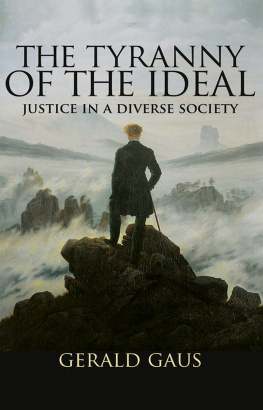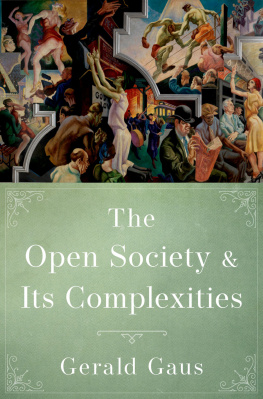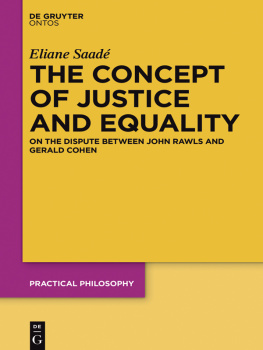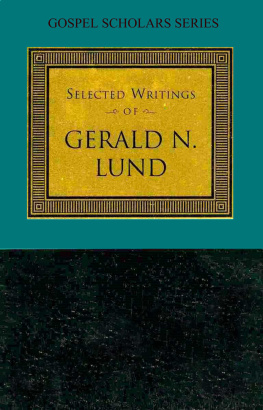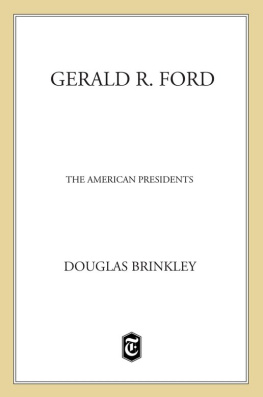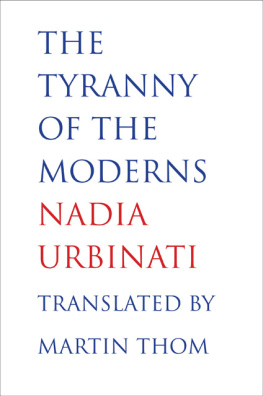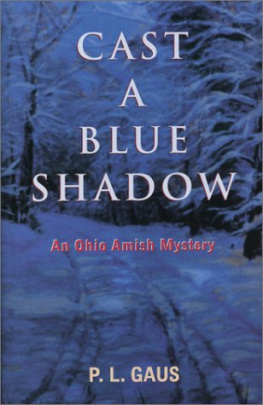Gerald Gaus - The Tyranny of the Ideal: Justice in a Diverse Society
Here you can read online Gerald Gaus - The Tyranny of the Ideal: Justice in a Diverse Society full text of the book (entire story) in english for free. Download pdf and epub, get meaning, cover and reviews about this ebook. year: 2019, publisher: Princeton University Press, genre: Politics. Description of the work, (preface) as well as reviews are available. Best literature library LitArk.com created for fans of good reading and offers a wide selection of genres:
Romance novel
Science fiction
Adventure
Detective
Science
History
Home and family
Prose
Art
Politics
Computer
Non-fiction
Religion
Business
Children
Humor
Choose a favorite category and find really read worthwhile books. Enjoy immersion in the world of imagination, feel the emotions of the characters or learn something new for yourself, make an fascinating discovery.
- Book:The Tyranny of the Ideal: Justice in a Diverse Society
- Author:
- Publisher:Princeton University Press
- Genre:
- Year:2019
- Rating:5 / 5
- Favourites:Add to favourites
- Your mark:
- 100
- 1
- 2
- 3
- 4
- 5
The Tyranny of the Ideal: Justice in a Diverse Society: summary, description and annotation
We offer to read an annotation, description, summary or preface (depends on what the author of the book "The Tyranny of the Ideal: Justice in a Diverse Society" wrote himself). If you haven't found the necessary information about the book — write in the comments, we will try to find it.
The Tyranny of the Ideal: Justice in a Diverse Society — read online for free the complete book (whole text) full work
Below is the text of the book, divided by pages. System saving the place of the last page read, allows you to conveniently read the book "The Tyranny of the Ideal: Justice in a Diverse Society" online for free, without having to search again every time where you left off. Put a bookmark, and you can go to the page where you finished reading at any time.
Font size:
Interval:
Bookmark:

The Tyranny of the Ideal
The Tyranny of the Ideal
JUSTICE IN A DIVERSE SOCIETY
Gerald Gaus
PRINCETON UNIVERSITY PRESS
Princeton and Oxford
Copyright 2016 by Princeton University Press
Published by Princeton University Press, 41 William Street, Princeton, New Jersey 08540
In the United Kingdom: Princeton University Press, 6 Oxford Street, Woodstock, Oxfordshire OX20 1TW
press.princeton.edu
All Rights Reserved
ISBN 978-0-691-15880-8
Library of Congress Control Number: 2016930321
British Library Cataloging-in-Publication Data is available
This book has been composed in Linux Libertine
Printed on acid-free paper.
Printed in the United States of America
10 9 8 7 6 5 4 3 2 1
For my graduate students, with thanks for all they have taught me
For those who have eaten from the tree of knowledge, paradise is lost.
KARL POPPER, The Open Society and Its Enemies
Summary of Contents
Contents
Preface
POLITICAL PHILOSOPHY IS AMBIVALENT ABOUT THE USE OF MODELS. FOR almost fifty years one modelthe original positionhas been a mainstay of political philosophy. From their nearly half-century obsession with the veil of ignorance and maximin, one might think that political philosophers love nothing more than an apparently interminable modeling dispute. The original position, however, is the grand exception: for the most part political philosophers have been wary of formal models.
It is not that political philosophers do not employ modelsthey simply prefer narrative to more formal models. The use of metaphors, for example, pervades political philosophy, especially in recent writings ), as all theory must; when we formalize our models we are aware of where, and in what way, we have idealized or abstracted.
Those who are suspicious of formal (and in particular, of mathematical) models of reasoning, observes Amartya Sen in his Nobel Prize Lecture, are often skeptical of the usefulness of discussing real-world problems in this way. will show how his formal work in social choice aggregation reveals a path through some of the most perplexing tangles concerning social morality in a diverse society.
Political philosophers opposed to a formal model often point out that some relevant variable has been omitted, some possible strategy not included. Now by their nature all models are incomplete: they build possible worlds that we understand by reducing complexity. The aim is to gain understanding of our complex world through understanding a simpler one that captures key elements, which are obscured when we consider the problem in all its complexity. Good modeling has two features: it is aware of when and where it has simplified and, having explored the insights of simpler models, moves on to look at how things change when we add a bit more complexity. commences with a fairly simple model, the inadequacies of which will be the focus of later discussions. Of course, even at the end, the analysis will capture only some things, not everything. The fundamental question for philosophic modeling, as it is for all philosophy, is whether we have gained insight through constructing a clear analysis.
One reason that political philosophers often recoil at more formal approaches is that we (and I do mean we) are not typically math whizzes. As in my On Philosophy, Politics, and Economics, I seek as far as possible to present these formal models (as a game theorist friend of mine puts it) in words. When words fail me, I employ graphical representations; only in one or two places do I employ (simple) algebraic equations. I have also used extensive examplesboth contrived and actualto clarify the various points; and I have built in some redundancy regarding statements of the core ideas. Any political philosopher should be able to work through the presentation; no doubt some pausing and rereading will help, but I have tried to minimize the need for it. When readers disagree with me, they should know precisely on what point and why. I take this to be an advantage, not a liability.
While my method is considerably more formal than the standard in political philosophy (although informal in the context of other disciplines), my aims are not simply analytic, but normative (at least on my understanding of normative). As Karl Popper stressed in his great, frequently disparaged The Open Society and Its Enemies, political philosophy has often been under the spell of a Platonic conviction that there is an ideally just social arrangement, that wise people would eventually concur on it, and that our actual political practice should orient itself by this ideal. We may not be able to achieve it down to the last detail, but it should be an aspiration that guides, and gives meaning to, our political existence. Popper wrote when Marxism, the great twentieth-century ideology of the ideal, was a powerful political program, threatening the very existence of the Open Society. I count myself as immensely fortunate that this particular pursuit of the ideal is no longer a practical political worry. It no longer threatens political tyranny over us. But within the academy, and especially current Anglo-American political philosophy, the allure of the ideal is as powerful as ever. The sophisticated work of G. A. Cohen, of David Estlund, and even that of John Rawls (who, we will see, has a much more ambiguous place in ideal theorizing) inspires political philosophy to imagine perfectly just, morally homogeneous, well-ordered societies where we all agree on the correct principles, our institutions conform to them, and we all are committed to them. In comparison to this ideal of final justice and moral homogeneity, our actual diverse societies, with diverse religious, moral, and political perspectives, look like life in the chaotic cave. If only we could make some progress on a collective quest to the ultimate end of the homogeneity of the perfectly just well-ordered society.
In this book my criticism of this posture is largely internal: I try to show that under the conditions of human existence, we cannot know what such an ideal would beunless we disagree about it. Only those in a morally heterogeneous society have a reasonable hope of actually understanding what an ideal society would be like, but in such a society we will never be collectively devoted to any single ideal. The ideal of the realistic utopia of the well-ordered society tyrannizes over our thinking, preventing us from discovering more just social conditions. And, as Sen rightly observed, we will see that ideal theory forces a morally unattractive choice on us: fix local justice or pursue the ideal.
But, then, what is the moral status of an open, diverse society that is constantly disagreeing about justice? achievement of the first order, allowing highly diverse perspectives to share a public world of moral responsibility, sometimes clashing, but often interacting in ways that make the world better for all, and allows us to better understand our different moral truths. Or so I shall argue.
I have been extremely fortunate in having been able to refine these ideas before a number of diverse audiences. Some material from was delivered as the Brian Barry Lecture at the London School of Economics. Other parts of the project were presented at the Copenhagen Conference on the Epistemology of Liberal Democracy, the Workshop in Philosophy, Politics, and Economics at George Mason University, the Kings College (London) Political Economy seminar, the 2011 Dubrovnik Conference organized by the Ohio State University Philosophy Department, the workshop on Fairness and Norms at the University of Tilburg, the University of Rijeka Scientific Colloquium, the Groupe de Recherche Interuniversitaire en Philosophie Politique workshop at McGill University, the Center for Human Values at Princeton University, the University of Pennsylvania PPE workshop, the workshop on public reason at Darmstadt Technical University, the Whither American Conservatism? conference held at the University of Texas-Austin Law School, the Workshop on New Directions in Public Reason at the University of Birmingham, and meetings of the Central Division of the American Philosophical Association and the American Political Science Association. My thanks to all the organizers and participants, whose objections and questions really have been critical in helping refine these ideas.
Next pageFont size:
Interval:
Bookmark:
Similar books «The Tyranny of the Ideal: Justice in a Diverse Society»
Look at similar books to The Tyranny of the Ideal: Justice in a Diverse Society. We have selected literature similar in name and meaning in the hope of providing readers with more options to find new, interesting, not yet read works.
Discussion, reviews of the book The Tyranny of the Ideal: Justice in a Diverse Society and just readers' own opinions. Leave your comments, write what you think about the work, its meaning or the main characters. Specify what exactly you liked and what you didn't like, and why you think so.

